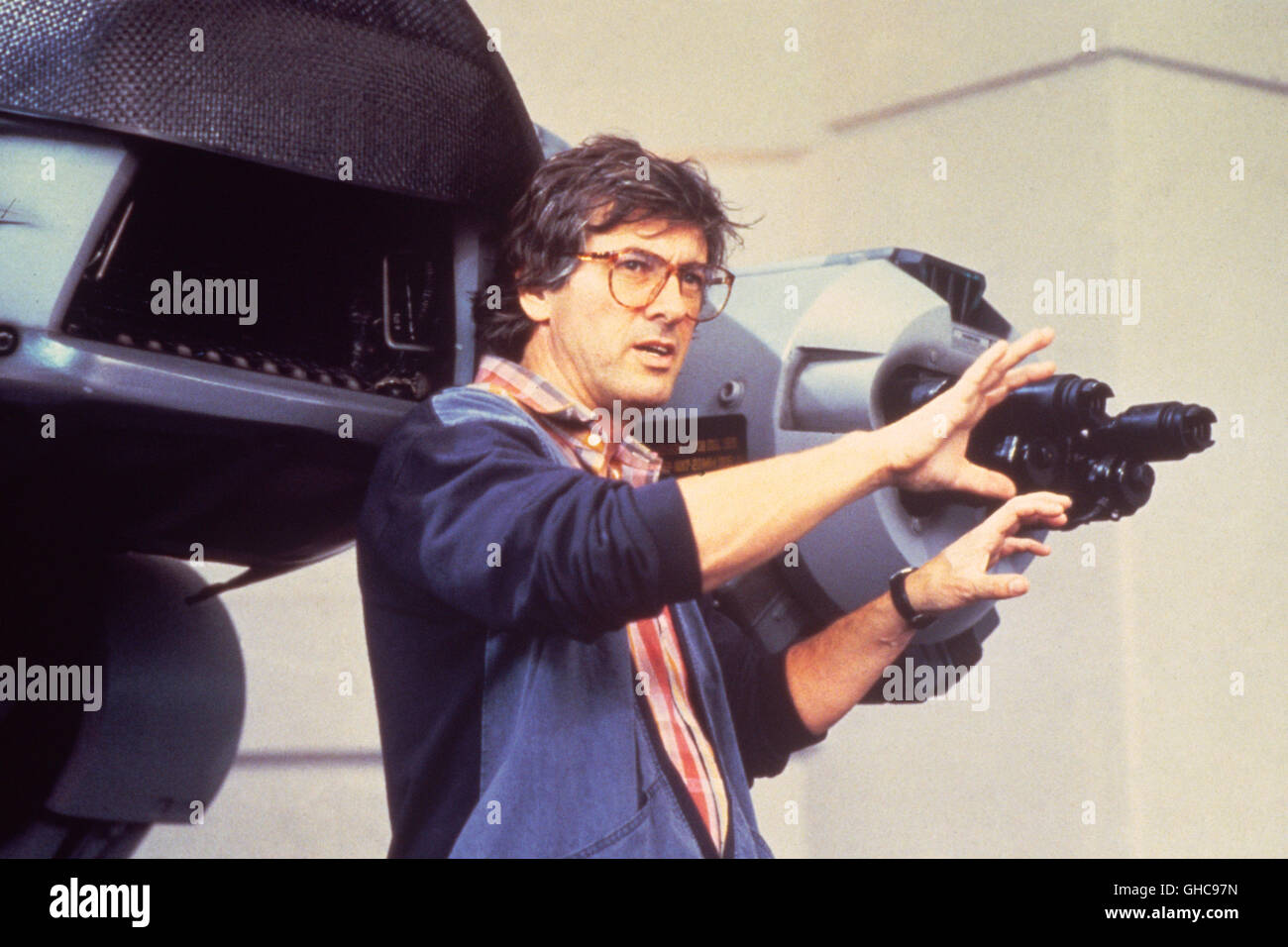When we talk about filmmakers who truly challenge us, the name of a certain Dutch director often comes up. That, is Paul Verhoeven, a truly distinct voice in cinema. His films, you know, they really get people talking. They are often very, very direct, sometimes even shocking, but they always, always make you think about things.
He is a director who has, in some respects, left a big mark on both European and Hollywood cinema. His stories are just a little different, exploring themes that can be quite intense, like violence, sexuality, and the very nature of human society. It's almost like he wants us to look closely at what we might prefer to ignore.
So, if you're curious about a filmmaker who is never afraid to push boundaries, and honestly, to make a statement with every single frame, then getting to know the work of Verhoeven director is definitely something to consider. His movies are, quite simply, unforgettable, leaving a lasting impression on viewers.
Table of Contents
- Biography and Personal Details of Paul Verhoeven
- The Early Years: Dutch Masterpieces
- Hollywood Impact and Sci-Fi Satires
- Verhoeven's Unique Style and Recurring Themes
- Controversy and Critical Reception
- Return to European Cinema
- Frequently Asked Questions About Verhoeven Director
Biography and Personal Details of Paul Verhoeven
Paul Verhoeven, a very, very influential Verhoeven director, has had a long and rather interesting career. He was born in Amsterdam, which is in the Netherlands, and his early life was actually shaped by the Second World War. This experience, arguably, later played a part in some of the more intense themes you see in his films, like the darkness of human behavior and the nature of power.
He first studied mathematics and physics at Leiden University, which is pretty cool, before he went into filmmaking. His background in science, in a way, might have given him a very analytical approach to storytelling, even when dealing with very human, emotional subjects. He started out making documentaries and TV shows, learning his craft, before moving into feature films that really got people talking, both good and bad, you know?
Here is a quick look at some personal details about him:
| Detail | Information |
|---|---|
| Full Name | Paul Verhoeven |
| Date of Birth | July 18, 1938 |
| Place of Birth | Amsterdam, Netherlands |
| Nationality | Dutch |
| Occupation | Film Director, Screenwriter, Producer |
| Education | Leiden University (Mathematics and Physics) |
| Active Years | 1960s – Present |
The Early Years: Dutch Masterpieces
Before making a big splash in Hollywood, Verhoeven director built a strong reputation in his home country. His Dutch films, they are actually pretty remarkable, often raw and quite daring for their time. Films like "Turkish Delight" (1973) were incredibly popular, becoming, in some respects, the most successful Dutch film ever. It tells a very passionate, sometimes tragic, love story, and it really shows his ability to capture raw human emotion.
"Soldier of Orange" (1977), is another major one from this period. This war drama, based on a true story, really showcased his talent for large-scale storytelling and exploring themes of betrayal and heroism during wartime. It was a big hit internationally, too, and it arguably helped pave his way to working in the United States. He also directed "Spetters" (1980), which, you know, was a bit more controversial, dealing with young people and their struggles, and it certainly got people talking about him even more.
These early works, they pretty much established his signature style: a willingness to portray violence and sexuality openly, a critical eye on society, and a knack for getting powerful performances from his actors. They are, in a way, a very clear foundation for what was to come later in his career.
Hollywood Impact and Sci-Fi Satires
When Verhoeven director made the move to Hollywood, he really brought his distinct vision with him. He quickly became known for directing big, action-packed science fiction films that were also, very cleverly, satires of American society. "RoboCop" (1987), for instance, is a brilliant example. It's a violent action movie, yes, but it's also, you know, a very sharp critique of corporate greed, media sensationalism, and urban decay. It's actually quite smart, if you look past the explosions.
Then came "Total Recall" (1990), starring Arnold Schwarzenegger. This film, based on a Philip K. Dick story, is a wild ride, blurring the lines between reality and illusion. It's got amazing special effects for its time, but it also makes you think about identity and memory. It was a huge box office success, and it really cemented his place as a director who could handle big budgets and deliver exciting, yet thought-provoking, blockbusters.
Later, "Starship Troopers" (1997) was another one that truly stood out. This movie, on the surface, looks like a straightforward sci-fi war film about humans fighting giant bugs. But, you know, it's actually a very, very biting satire of fascism, militarism, and propaganda. It uses over-the-top violence and patriotic imagery to really make its point, and it's quite brilliant in its execution, honestly. Many people, at first, missed the satire, but over time, it's become much more appreciated for its deeper meaning. These films show that a Verhoeven director can use popular genres to explore very complex ideas.
Verhoeven's Unique Style and Recurring Themes
The style of Verhoeven director is pretty much unmistakable. He often uses very, very dynamic camera work, and his films have a certain energy that just pulls you in. He is, in some respects, known for his unflinching portrayal of violence, which can be quite graphic, and also for his open approach to sexuality. He doesn't shy away from showing things as they are, or as he perceives them to be, which can be a bit much for some viewers, but it's part of his artistic choice.
A big part of his approach is, you know, a kind of dark humor and irony. Even in his most serious or violent films, there's often an undercurrent of satire or a wink to the audience. He likes to play with genre conventions, taking something familiar and twisting it to make a point. This often makes his films feel very fresh and unpredictable, even decades later.
When it comes to themes, a Verhoeven director often explores the darker side of human nature. He looks at power structures, how people behave under pressure, and the corruption that can come with authority. He is also, very much, interested in the role of media and propaganda in shaping our perceptions of reality. You see this, for instance, in films like "RoboCop" and "Starship Troopers," where the news broadcasts are a key part of the story, showing how easily people can be manipulated. He also often examines the struggle between instinct and civilization, and how society tries to control our more primal urges, sometimes unsuccessfully.
Another recurring idea is the idea of moral ambiguity. His characters are rarely purely good or purely evil; they are, you know, complex, flawed people making difficult choices in morally grey situations. This makes his films feel very real, even when they are set in fantastical worlds. He wants us to question things, to not just accept what we see on the surface, but to dig a little deeper into the motivations and consequences. This is, in a way, why his films stay with you long after the credits roll.
Controversy and Critical Reception
It's pretty much impossible to talk about Verhoeven director without talking about controversy. His films, you know, have a tendency to stir things up. "Basic Instinct" (1992), for example, was a huge commercial success, but it also faced a lot of criticism for its graphic sexual content and its portrayal of certain characters. It was, in a way, a film that divided audiences and critics quite sharply, with some praising its boldness and others condemning its perceived exploitation.
Similarly, "Showgirls" (1995) was, at the time, absolutely slammed by critics and audiences alike. It was seen as a huge flop and even won a lot of "worst film" awards. However, over the years, that film has actually gained a cult following. People have started to re-evaluate it, seeing it now as a very, very sharp satire of the entertainment industry and the American dream, which is pretty interesting, right? It just goes to show how perceptions can change over time.
Despite the controversies, Verhoeven director has also received significant critical acclaim. His early Dutch films are often celebrated, and even his more divisive Hollywood works are recognized for their technical skill and their underlying intelligence. He has a very loyal fan base who appreciate his unique vision and his refusal to compromise. His ability to provoke discussion, even anger, is, in some respects, a sign of his power as a filmmaker. He doesn't want you to just passively watch; he wants you to react, to think, to argue about what you've seen.
You can find out more about how directors use film to provoke thought by checking out other discussions on film analysis and critical thinking. It is actually quite fascinating how a single film can spark so much conversation, and Verhoeven's work is a prime example of this.
Return to European Cinema
After his experiences in Hollywood, Verhoeven director decided to return to making films in Europe. This move, you know, allowed him to work with more creative freedom, outside of the studio system's constraints. His film "Black Book" (2006), made in the Netherlands, was a big success. It's a powerful and complex thriller set during World War II, telling the story of a Jewish singer who goes undercover to infiltrate the Nazi resistance. It was praised for its intricate plot and its morally ambiguous characters, which is, honestly, a very classic Verhoeven trait.
More recently, "Elle" (2016) really brought him back into the international spotlight. This French-language film, starring Isabelle Huppert, is a very, very daring psychological thriller about a woman who seeks revenge after being assaulted. It was incredibly well-received by critics, earning many awards and nominations, including an Oscar nomination for Huppert. This film, in a way, solidified his reputation as a master storyteller who can handle incredibly sensitive and challenging material with nuance and depth.
His latest work, "Benedetta" (2021), continues this trend of provocative and thought-provoking cinema. It's a historical drama about a 17th-century nun who has controversial religious visions and a passionate affair with another nun. This film, you know, once again, stirred up a lot of discussion due to its themes of faith, sexuality, and power within the church. It just goes to show that Verhoeven director, even now, is still pushing boundaries and making films that are anything but ordinary. He continues to explore the human condition in ways that are often uncomfortable but always compelling.
Frequently Asked Questions About Verhoeven Director
People often have questions about Paul Verhoeven and his unique approach to filmmaking. Here are some common ones:
What themes does Paul Verhoeven often explore?
Paul Verhoeven, as a director, very often looks at themes like the dark side of human nature, you know, especially violence and sexuality. He also explores power structures, how society controls people, and the role of media in shaping what we believe. He is, in a way, very interested in moral ambiguity, showing characters who are neither fully good nor fully bad, which is pretty compelling.
Which are some of Paul Verhoeven's most famous movies?
Some of his most famous films include his Dutch works like "Turkish Delight" and "Soldier of Orange." In Hollywood, he is very well known for "RoboCop," "Total Recall," and "Starship Troopers." More recently, his European films "Black Book" and "Elle" have also gained a lot of attention, and they are, honestly, very, very good.
Why is Paul Verhoeven considered a controversial director?
He is considered controversial largely because he does not shy away from explicit content, both violence and sexual situations. His films often challenge social norms and can be seen as provocative, which, you know, sometimes upsets people. He also uses satire in ways that some viewers might initially miss, leading to misunderstandings about his intentions, which is, in a way, part of his charm.
So, as you can see, the work of Verhoeven director is truly distinctive, pushing boundaries and inviting viewers to think deeply about complex ideas. His films, you know, whether they are big Hollywood blockbusters or more intimate European dramas, always leave a lasting impression. If you're looking for cinema that challenges and provokes, definitely check out his filmography. You can learn more about film history on our site, and also find out more about filmmaking techniques that directors like Verhoeven use to create their powerful stories.



Detail Author:
- Name : Mariana Keebler
- Username : rheaney
- Email : qrogahn@kuhn.org
- Birthdate : 2003-03-27
- Address : 447 Kiera Knoll West Dane, VT 52134-1808
- Phone : 1-772-210-2377
- Company : Will-Rogahn
- Job : Food Scientists and Technologist
- Bio : Laudantium magni magnam voluptatem. Vel commodi optio qui voluptatem laudantium. Nisi quod mollitia qui doloribus nesciunt fugit omnis.
Socials
instagram:
- url : https://instagram.com/heaven3629
- username : heaven3629
- bio : Earum et et incidunt non cupiditate dolor ut. Aliquid vel doloremque possimus qui rerum fugit.
- followers : 881
- following : 833
tiktok:
- url : https://tiktok.com/@heaven.hoppe
- username : heaven.hoppe
- bio : Quibusdam ex reiciendis molestiae nemo ut sed exercitationem quia.
- followers : 4003
- following : 1597
facebook:
- url : https://facebook.com/heaven.hoppe
- username : heaven.hoppe
- bio : Assumenda tempora sit corporis nihil.
- followers : 4082
- following : 2053